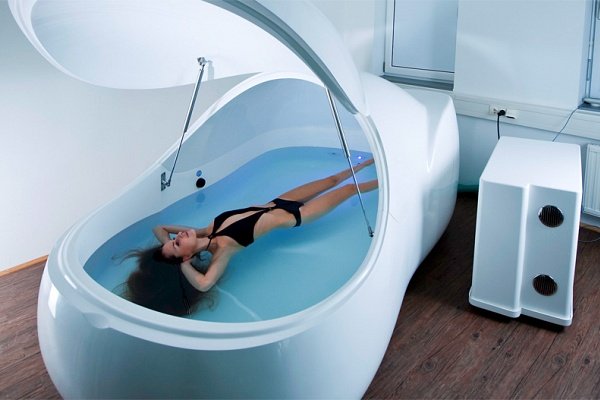28 May 2022, by i-sopod
If you have an important deadline for work, or you’re studying for an exam, time in a float tank might not be the first thing that comes to mind to help you focus…
As it happens, float therapy is incredibly conducive to enhanced learning and concentration. Let’s unpack exactly how and why that is.
Fear and Stress Blocks
Firstly, when you’re working towards something important it’s pretty normal to feel stress levels rising. Some people say a bit of pressure and nerves pushes they to actually achieve more… But when the nervousness, stress, and fear of the looming deadline or exam build up too much, it’s quite natural to reach a place were you feel blocked and paralysed; as though nothing is sinking in from your studying, or that the work you’re producing just isn’t up to your normal standards.
Stress can do crazy things to us. We can pull all-nighters and drink gallons of coffee just to keep going, but the stress continues to mount and we’re not really getting anywhere with the workload. Or we can go into self sabotage mode and procrastinate despite all our best intentions. It’s easy to slip into unhealthy habits when you’re stressed, habits which are not conducive to you succeeding and reaching your goals!
Relaxing the mind
An hour in a float tank can do miracles for your stress levels. Without you having to even try, you will find yourself slipping into a more relaxed state as you float.
Initially if you’re really stressed it might seem impossible: when really anxious, those first 15 min in the float tank can be tricky, and your mind might be racing:
What am I doing in here? I’m wasting my time. I should be working! This isn’t going to help me.
But be patient with the float and with yourself. After not very long at all, the Epsom salts’ high magnesium levels and the zero gravity effect start working their magic, and you’ll feel the tension slowly leaving your body and your mind.
Floatation also reduces cortisol levels, the hormone which keeps us on high alert, in fight or flight mode. When cortisol levels are constantly running high, we risk burning out and getting sick.
Give yourself an hour like this – once a week or more ideally – and see how much more focused and calm you can be with your work or studies, and how much easier you can achieve what you set out.
Improve Brain Function
We spend a lot, if not the majority, of our waking hours operating on beta brainwaves. Beta is the state of mind which keeps us alert and functioning, able to complete tasks and deal with whatever’s in front of us.
While we are able to get a lot done when in beta mode, there’s an extra level of deep focus and understanding that is beyond reach when in this state.
That’s where theta brainwaves come in. Theta state is less about surface level problem solving, and more of a clear and meditative state of mind. This is the state our brain enters after time in a float pod.
The benefits of theta for studying: your brain becomes less distracted, you’re able to focus for longer, and to absorb more information, and to understand it at a deeper level.
Read more about how floating impacts brain function here.
The Evidence
A science study in the 1980s looked at exactly what floatation could do for our learning capacity. In 1982, a research project led by Prof Thomas Taylor had two groups of people listen to a recorded lesson; one group were sat on a sofa whilst listening, the other group listened whilst they floated in isolation pods. The results were clear:
“There’s no question that the experimental group learned more, but where they learned is the most important point. People who floated learned at a different cognitive level. The results show that the more difficult the concept, the bigger the difference in the performance of the two groups.”
~ Prof. Thomas Taylor, The Book of Floating: Exploring The Private Sea, 1984
A conversation we had a while back with Ray Thoma, founder of The Float Spot TX, also showed just how beneficial floating can be for learning. Ray told us that he had met two barristers who were going for a float the night before a big court case:
‘When they got up the next day to go to court they felt like they were cheating, because everything was at the top of their head – they could go from point A to point p.53, at the snap of a finger – and felt like they had an advantage in court. I thought, man, there’s not an attorney I’ve met in my life who’s capable of relaxing – they’re all highly strung. I thought, if [floating] could do that for an attorney […] then maybe this isn’t just for athletes maybe this is for the general population.’
Read the rest of the interview here.
It’s no surprise, then, that the US military have float tanks installed to help recruits absorb new languages and skills.
Floatation gives you a unique opportunity to tune out from all the noise in your life, and all the external sensory stimulation which is so distracting. Because of this, it’s not just the after effects of floating which help with studying and concentration, it’s also the experience in the tank.
Many artists, thinkers and business people have shared that they float to have the time and space to really go deeper into their ideas, and that they find their thought process flows a lot better as they float.
So if you’re struggling to get through a mountain of work on time, or if you have a big assignment or important exam that’s stressing you out, as counter productive as an hour of quite literally floating about doing nothing might initially seem… We recommend giving it a try! You may well be pleasantly surprised.






